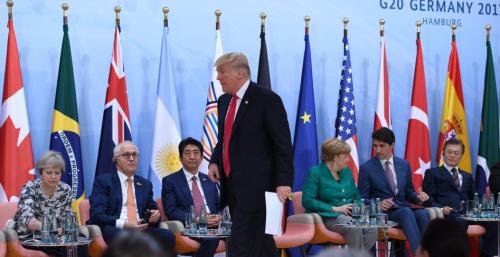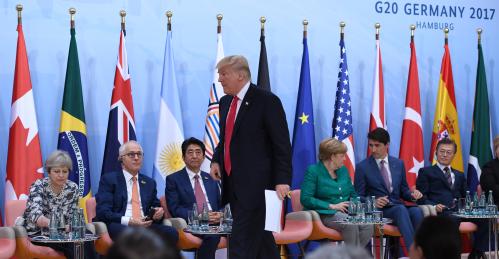There has been a lot of focus on the G-20 backtracking on its explicit rejection of protectionism at a meeting in Baden Baden, Germany over the weekend. In their communique, G-20 finance chiefs shifted from the usual received G-20 language that it would “resist all forms of protectionism,” to the weaker language that “we are working to strengthen the contribution of trade to our economies.”
Make no mistake, this would be a significant change if it were to carry through to the G-20 leaders summit communique in Hamburg in July.
The removal of strong language against protectionism would represent a shift in one of the foundational elements of the post-2008 G-20, the others being closer macroeconomic cooperation and stronger financial regulation. This stand on trade reflects a keen awareness among G-20 leaders of one of the lessons from the Great Depression of the 1930s, which triggered a damaging growth in protectionist measures (which added to the more significant damages arising from monetary policy mistakes).
This is not to say the G-20 stance against protectionism has been fully effective. G-20 countries have instituted many individual measures to restrict trade since 2008. However, the strong consensus on policy principle, and explicit commitments to “standstill and rollback” protectionist measures, has played a role in restricting a damaging general return to tit-for-tat protectionism.
The U.S. position going into this G-20 meeting also represented the first official international expression of the significant domestic shift on trade that occurred with the election of U.S. President Donald Trump. Indeed, it would have been surprising if a U.S. delegation signed up to the old language against this background.
Nevertheless it is important to keep this language shift in perspective.
The rhetorical shift does not herald an imminent trade war or even a permanent change in the G-20 consensus. The U.S domestic policy expression of the campaign pledges on trade is just emerging. While a decision has been made not to proceed with the Trans-Pacific Partnership, broader trade policy is subject to a fierce debate within the U.S. administration. Indeed, differences between the administration and other influential players, not least elements of the Republican dominated Congress, are significant. It remains to be seen whether a fundamental change in the U.S. approach to global trade will result.
In this context, it is important that the international community negotiates hard on these norms, to add what pressure it can to the domestic scales of debate. By all accounts the U.S. representatives in Baden Baden heard loud and clear the strong view of other countries (many of whom are close U.S. allies, and all of whom are important partners) on the positive contribution of trade to prosperity, and the dangers of protectionism. The direct engagement between players at G-20 meetings is vital, no matter the final negotiated outcome. This dynamic will be critical at the leaders meeting in Hamburg in July.
But it is also important that the other G-20 countries engage the U.S. in finding the best possible consensus language supporting trade and related international institutions and commitments.
But it is also important that the other G-20 countries engage the U.S. in finding the best possible consensus language supporting trade and related international institutions and commitments. This will be both more important and harder in the G-20 summit in Hamburg in July, where there is more detailed trade language to negotiate. It is helpful in this context that the G-20 is at the same time focusing its attention on underlying concerns of citizens—the growth and distribution of economic opportunities (“inclusive and fair” growth in communique language). This is ultimately a more constructive way to address the range of policy issues associated with the structural changes being brought about by trade and technology.
For now, other elements of the G-20 consensus remain largely intact. The language on financial regulation and tax cooperation appears largely in line with the inherited G-20 agenda.
Indeed, the strong pre-existing language on currency and the need to address global imbalances, which was largely unchanged, will prove helpful to the task of engaging the new administration over time. These sentiments, at least at a high level, are consistent with the new administration’s views—for example, that countries should not engage in devaluations to gain competitive advantage. This hopefully underpins the ongoing usefulness of such international fora. It also shows that tampering too much with hard-won consensus statements has downsides as well.
Perhaps the strongest factor that will prevent a conversion of protectionist rhetoric into damaging action is the overall global economic context.
Perhaps the strongest factor that will prevent a conversion of protectionist rhetoric into damaging action is the overall global economic context. As the G-20 finance ministers and central bank governors note, the economic recovery seems finally to be taking hold, or “progressing” in the understated language of communiques. But global growth remains weaker than desirable and significant downside risks remain. They go on to reiterate their commitment to economic cooperation and, directly before the watered-down trade comment, undertake to reduce policy uncertainty to minimize negative spillovers between countries.
This general backdrop of strengthening recovery in the presence of remaining risks gives extra ammunition for those inside the U.S. arguing for caution against putting the anti-trade rhetoric into practice. The last thing that the global economy needs are the unpredictable consequences that could come with a shock to trade flows arising from unilateral trade actions.
The most immediate goal then is to prevent a damaging conversion of anti-trade rhetoric into action and constraining to the extent possible the erosion of important international norms around trade. This involves engaging the new U.S. administration on trade on all fronts, including through G-20 Leaders. And hopefully, over time, the U.S. may revert to its earlier principled support for the liberal global world order that it has done more than any other country to create.
The Brookings Institution is committed to quality, independence, and impact.
We are supported by a diverse array of funders. In line with our values and policies, each Brookings publication represents the sole views of its author(s).






Commentary
G-20 and trade: How worried should we be?
March 22, 2017